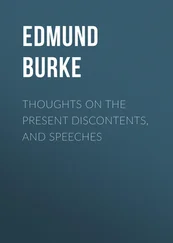Edmund Burke - Selections from the Speeches and Writings of Edmund Burke
Здесь есть возможность читать онлайн «Edmund Burke - Selections from the Speeches and Writings of Edmund Burke» — ознакомительный отрывок электронной книги совершенно бесплатно, а после прочтения отрывка купить полную версию. В некоторых случаях можно слушать аудио, скачать через торрент в формате fb2 и присутствует краткое содержание. Жанр: foreign_prose, История, Политика, literature_19, foreign_edu, foreign_antique, на английском языке. Описание произведения, (предисловие) а так же отзывы посетителей доступны на портале библиотеки ЛибКат.
- Название:Selections from the Speeches and Writings of Edmund Burke
- Автор:
- Жанр:
- Год:неизвестен
- ISBN:нет данных
- Рейтинг книги:4 / 5. Голосов: 1
-
Избранное:Добавить в избранное
- Отзывы:
-
Ваша оценка:
- 80
- 1
- 2
- 3
- 4
- 5
Selections from the Speeches and Writings of Edmund Burke: краткое содержание, описание и аннотация
Предлагаем к чтению аннотацию, описание, краткое содержание или предисловие (зависит от того, что написал сам автор книги «Selections from the Speeches and Writings of Edmund Burke»). Если вы не нашли необходимую информацию о книге — напишите в комментариях, мы постараемся отыскать её.
Selections from the Speeches and Writings of Edmund Burke — читать онлайн ознакомительный отрывок
Ниже представлен текст книги, разбитый по страницам. Система сохранения места последней прочитанной страницы, позволяет с удобством читать онлайн бесплатно книгу «Selections from the Speeches and Writings of Edmund Burke», без необходимости каждый раз заново искать на чём Вы остановились. Поставьте закладку, и сможете в любой момент перейти на страницу, на которой закончили чтение.
Интервал:
Закладка:
POLITICS WITHOUT PRINCIPLE
People not very well grounded in the principles of public morality find a set of maxims in office ready made for them, which they assume as naturally and inevitably, as any of the insignia or instruments of the situation. A certain tone of the solid and practical is immediately acquired. Every former profession of public spirit is to be considered as a debauch of youth, or, at best, as a visionary scheme of unattainable perfection. The very idea of consistency is exploded. The convenience of the business of the day is to furnish the principle for doing it. Then the whole ministerial cant is quickly got by heart. The prevalence of faction is to be lamented. All opposition is to be regarded as the effect of envy and disappointed ambition. All administrations are declared to be alike. The same necessity justifies all their measures. It is no longer a matter of discussion, who or what administration is; but that administration is to be supported, is a general maxim. Flattering themselves that their power is become necessary to the support of all order and government, everything which tends to the support of that power is sanctified, and becomes a part of the public interest.
MORAL DEBASEMENT PROGRESSIVE
I believe the instances are exceedingly rare of men immediately passing over a clear, marked line of virtue into declared vice and corruption. There are a sort of middle tints and shades between the two extremes; there is something uncertain on the confines of the two empires which they first pass through, and which renders the change easy and imperceptible. There are even a sort of splendid impositions so well contrived, that, at the very time the path of rectitude is quitted for ever, men seem to be advancing into some higher and nobler road of public conduct. Not that such impositions are strong enough in themselves; but a powerful interest, often concealed from those whom it affects, works at the bottom, and secures the operation. Men are thus debauched away from those legitimate connexions, which they had formed on a judgment, early perhaps but sufficiently mature, and wholly unbiassed.
DESPOTISM
It is the nature of despotism to abhor power held by any means but its own momentary pleasure; and to annihilate all intermediate situations between boundless strength on its own part, and total debility on the part of the people.
JUDGMENT AND POLICY
Nothing can render this a point of indifference to the nation, but what must either render us totally desperate, or sooth us into the security of idiots. We must soften into a credulity below the milkiness of infancy, to think all men virtuous. We must be tainted with a malignity truly diabolical, to believe all the world to be equally wicked and corrupt. Men are in public as in private, some good, some evil. The elevation of the one, and the depression of the other, are the first objects of all true policy. But that form of government, which, neither in its direct institutions, nor in their immediate tendency, has contrived to throw its affairs into the most trustworthy hands, but has left its whole executory system to be disposed of agreeably to the uncontrolled pleasures of any one man, however excellent or virtuous, is a plan of polity defective not only in that member, but consequentially erroneous in every part of it.
POPULAR DISCONTENT
To complain of the age we live in, to murmur at the present possessors of power, to lament the past, to conceive extravagant hopes of the future, are the common dispositions of the greatest part of mankind; indeed, the necessary effects of the ignorance and levity of the vulgar. Such complaints and humours have existed in all times; yet as all times have NOT been alike, true political sagacity manifests itself in distinguishing that complaint which only characterises the general infirmity of human nature, from those which are symptoms of the particular distemperature of our own air and season.
THE PEOPLE AND THEIR RULERS
I am not one of those who think that the people are never in the wrong. They have been so, frequently and outrageously, both in other countries and in this. But I do say, that in all disputes between them and their rulers, the presumption is at least upon a par in favour of the people. Experience may perhaps justify me in going farther. When popular discontents have been very prevalent, it may well be affirmed and supported, that there has been generally something found amiss in the constitution, or in the conduct of government. The people have no interest in disorder. When they do wrong, it is their error, and not their crime.
GOVERNMENT FAVOURITISM
It is this unnatural infusion of a government which in a great part of its constitution is popular, that has raised the present ferment in the nation. The people, without entering deeply into its principles, could plainly perceive its effects, in much violence, in a great spirit of innovation, and a general disorder in all the functions of government. I keep my eye solely on this system; if I speak of those measures which have arisen from it, it will be so far only as they illustrate the general scheme. This is the fountain of all those bitter waters, of which, through an hundred different conduits, we have drunk until we are ready to burst. The discretionary power of the Crown in the formation of ministry, abused by bad or weak men, has given rise to a system which, without directly violating the letter of any law, operates against the spirit of the whole constitution.
A plan of favouritism for our executory government is essentially at variance with the plan of our legislature. One great end undoubtedly of a mixed government like ours, composed of monarchy, and of controls, on the part of the higher people and the lower, is that the prince shall not be able to violate the laws. This is useful indeed and fundamental. But this, even at first view, in no more than a negative advantage; an armour merely defensive. It is therefore next in order, and equal in importance, THAT THE DISCRETIONARY POWERS WHICH ARE NECESSARILY VESTED IN THE MONARCH, WHETHER FOR THE EXECUTION OF THE LAWS, OR FOR THE NOMINATION TO MAGISTRACY AND OFFICE, OR FOR CONDUCTING THE AFFAIRS OF PEACE AND WAR, OR FOR ORDERING THE REVENUE, SHOULD ALL BE EXERCISED UPON PUBLIC PRINCIPLES AND NATIONAL GROUNDS, AND NOT ON THE LIKINGS OR PREJUDICES, THE INTRIGUES OR POLICIES, OF A COURT.
ADMINISTRATION AND LEGISLATION
In arbitrary governments, the constitution of the ministry follows the constitution of the legislature. Both the law and the magistrate are the creatures of will. It must be so. Nothing, indeed, will appear more certain, on any tolerable consideration of this matter, than that EVERY SORT OF GOVERNMENT OUGHT TO HAVE ITS ADMINISTRATION CORRESPONDENT TO ITS LEGISLATURE. If it should be otherwise, things must fall into a hideous disorder. The people of a free commonwealth, who have taken such care that their laws should be the result of general consent, cannot be so senseless as to suffer their executory system to be composed of persons on whom they have no dependence, and whom no proofs of the public love and confidence have recommended to those powers, upon the use of which the very being of the state depends.
INFLUENCE OF THE CROWN
The power of the Crown, almost dead and rotten as Prerogative, has grown up anew, with much more strength, and far less odium, under the name of Influence. An influence, which operated without noise and without violence; an influence which converted the very antagonist into the instrument of power; which contained in itself a perpetual principle of growth and renovation; and which the distresses and the prosperity of the country equally tend to augment, was an admirable substitute for a prerogative, that, being only the offspring of antiquated prejudices, had moulded into its original stamina irresistible principles of decay and dissolution. The ignorance of the people is a bottom but for a temporary system; the interest of active men in the state is a foundation perpetual and infallible.
Читать дальшеИнтервал:
Закладка:
Похожие книги на «Selections from the Speeches and Writings of Edmund Burke»
Представляем Вашему вниманию похожие книги на «Selections from the Speeches and Writings of Edmund Burke» списком для выбора. Мы отобрали схожую по названию и смыслу литературу в надежде предоставить читателям больше вариантов отыскать новые, интересные, ещё непрочитанные произведения.
Обсуждение, отзывы о книге «Selections from the Speeches and Writings of Edmund Burke» и просто собственные мнения читателей. Оставьте ваши комментарии, напишите, что Вы думаете о произведении, его смысле или главных героях. Укажите что конкретно понравилось, а что нет, и почему Вы так считаете.












